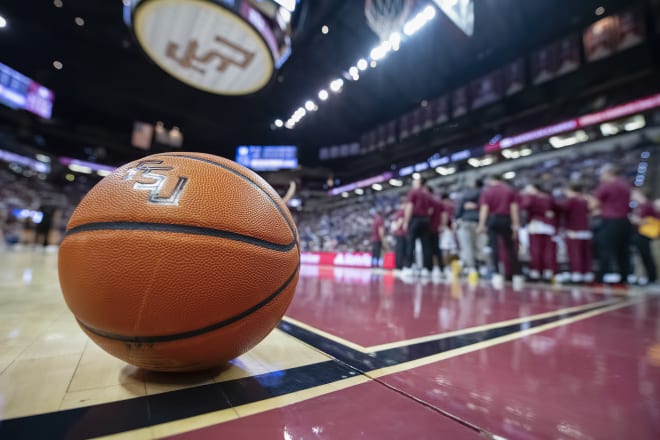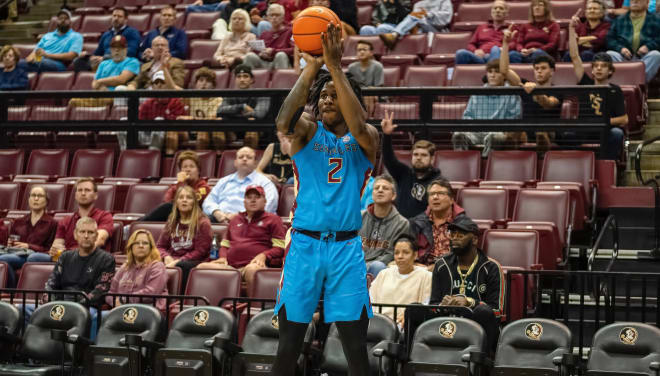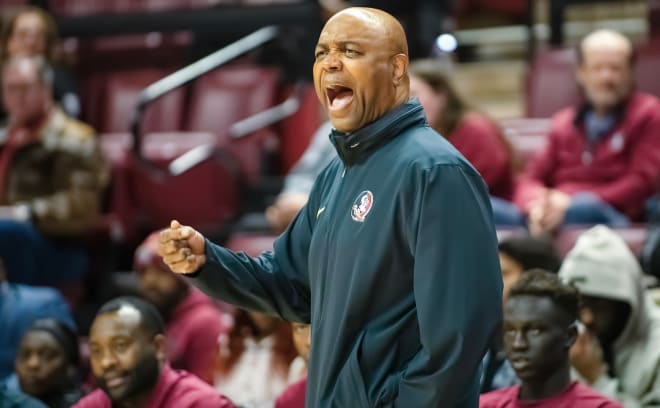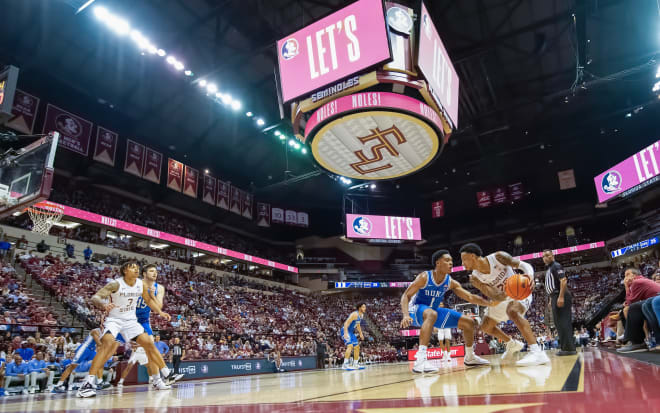State of the program: FSU basketball

The banner was set to be unveiled, hanging in the darkness but evident of its existence. If Florida State defeated Boston College, the Seminoles would win their first ACC regular-season title.
Moments after a blowout 80-62 victory, a crowning achievement for FSU after a 16-4 mark in league play. With veterans like Trent Forrest, Devin Vassell, M.J. Walker, RaiQuan Gray, Malik Osborne, Anthony Polite, Balsa Koprivica and Wyatt Wilkes, as well as freshman sensation Patrick Williams, there were projections that the Seminoles could make a deep run in the ACC Tournament and the NCAA Tournament, too.
A week later, the world stopped turning. COVID halted basketball tournaments around the country. FSU was declared the ACC Tournament champion in an awkward ceremony where the Seminoles looked stunned by what had happened and then-commissioner John Swofford made an announcement to the team.
FSU won a title on the court, another by default but missed out on the biggest prize: A team stacked with talent that could have made a run to the Final Four. It would have been the first for Leonard Hamilton and the first at FSU since 1972.
Hamilton is often viewed as a program-builder, turning around three of them known far more for their football interest (Oklahoma State, Miami and FSU) and shaping each into respectability. FSU had come very close in March 2018, falling to Michigan in the Elite 8 by just four points.
There’s nothing to be ashamed of with a spot in the Sweet 16 or Elite 8, but a Final Four would have brought an amount of gravitas to Hamilton’s resume: A coach who graduates nearly everyone who stays on campus four years in all three of his stops, while also recruiting talent to non-traditional hoops schools, developing athletes for life and pro basketball while achieving success against hoops blue bloods along the way.
A Final Four would have resulted in weeks of two-hour infomercials as FSU played on national TV, with headlines of player development and team cohesion. There was an entertaining book written by ESPN’s Dick Vitale, in which he projected the Seminoles won the national title. Hamilton was clearly appreciative and supported the book project, which helped Vitale’s charitable efforts.
As fun of a read as it was, it was based on reality but fictionalized. FSU was in the mix a year later in the NCAA Tournament and made the Sweet 16, but it was a different roster and nucleus and not a Final Four team.
FSU hoops can be viewed as a victim of its own success. Hamilton arrived in 2002 to a program that had fallen on hard times under Steve Robinson. It took time but the Seminoles reached the NCAA Tournament in 2009 and advanced seven more times (including March 2021).
But since then, FSU has suffered from injuries, departures of assistant coaches and misses on the recruiting trail (high school and transfers). The Seminoles went 17-14, 9-23 and 17-16. They are 10 games under .500 the last three seasons and without a postseason bid this March.
As the NCAA Tournament begins Tuesday with play-in games in the 68-team field, FSU really hasn't been close to even the bubble in each of the last three years.
What is the state of the FSU basketball program? It’s more than just a question. It’s a complicated one with many layers. And it’s more than just a commentary on Leonard Hamilton’s age. (While he could pass for 65, and perhaps 60, it’s 75.)
The Osceola dives into the issues surrounding FSU’s recent history, present and future.
A thin line between failure and success

Before we get into the future, and what’s next, we need to look at the current season.
This is a third straight season where FSU won’t play in the NCAA Tournament. After an impressive January, which included five straight wins, the Seminoles finished February and March with an 5-8 record.
FSU had its chances. Aside from UNC and Duke, the ACC was essentially wide open in the regular season. And even Georgia Tech stunned the Tar Heels and Blue Devils.
Now factor in this: FSU lost to four teams that were ranked 90 or worse in KenPom’s metrics: No. 90 Georgia in November, No. 97 Lipscomb in December, No. 198 Louisville in February and No. 127 Georgia Tech in March. Win three of those four and does your perception of FSU hoops in 2023-24 change? Regardless, those four winnable games would give FSU three more conference wins (the Seminoles went 10-10 in the ACC regular season).
Hamilton has been consistent in discussing FSU’s struggles. The only thing FSU has done consistently is display inconsistency on the court — that’s one of them. He’s admitted the Seminoles aren’t a good rebounding team, which is stunning considering the program is typically loaded with forwards and centers who can hit the glass. This year’s team had just one center, who barely played.
And the defense in the lane, without a rim protector, as well as on the perimeter?
“We have not been a good defensive team all year,” Hamilton said late in the regular season.
Beyond the issues with rebounding and defense, Hamilton’s startling admission was at the lack of vocal leaders on the roster.
“We have not had that type of leadership that we really feel like we needed basically the entire year,” Hamilton said. “We have a bunch of guys on the team that they’re laid-back guys, their personalities are somewhat quiet. We have struggled with identifying who those leaders are. For the most part, as a staff, we’ve been trying to be the leaders.”
With a little more effort on the glass or the defensive end, a few more rebounds, a better play call coming out of a timeout, even a somewhat-functional FSU team in a weak ACC could be in the ballpark of 20 wins. While Hamilton has frequently stated most ACC wins are decided by four points or less, that hasn’t been true as much across the league this season. Still, if rebounding is about heart and energy and coaching is about connecting with the players, building a game plan and bringing out the best in them, then the road map to a few more buckets, rebounds and defensive stops isn’t tough to envision.
Those add up to wins. For a combination of reasons — players, coaches, player development and roster management — FSU won 17 games and not 20 or 21.
Jamir Watkins was the only consistency, scoring 10 or more points in all but one ACC game (regular season as well as ACC Tournament). He masked some of FSU’s deficiencies.
There are some underlying factors with this 2023-24 roster. Yes, Hamilton built it along with his assistant coaches. But it’s also a roster constructed with the NIL limitations as well as that of FSU’s basketball facilities, which have been upgraded but the Donald L. Tucker Center is viewed as one of the lesser-quality venues in the ACC. It’s loud and excitable in big games against Duke or UNC but can be a quiet gym when the host is a losing team and doesn’t attract students.
Recruiting has changed quickly

Two of FSU’s best teams, the ones that won titles, had depth but also veterans. With the transfer portal and NIL, it’s tough to retain talent. And it’s tough to attract talent with deep-pocketed basketball blue bloods at schools like UNC, Duke, Kansas and SEC schools.
A number of head coaches in the SEC and elsewhere have also said the priority doesn’t need to be on improvements to the arena or basketball practice facilities. The priority to them is NIL. This speaks to a dramatic, shifting landscape for not just college athletics but its coaches.
Another issue for FSU is the loss of assistant coaches. Dennis Gates was on FSU’s staff from 2011-19 before landing head coaching jobs at Cleveland State and now Missouri. Charlton Young was on FSU’s staff from 2013-22 before joining Gates as an assistant at Missouri. Young’s salary is more than double what he earned at FSU.
Hamilton has hired Steve Smith and Kevin Nickelberry as assistant coaches to the staff, but neither have the recruiting ties in Georgia and the Southeast of Young or Gates. And neither bring the day-to-day basketball development of Young and Gates, although Smith is particularly close with Watkins. When asked in the preseason what Nickelberry brought to FSU basketball, Hamilton mentioned his presence in the mid-Atlantic region as a recruiter but nothing about him as a coach in a practice or game.
The portal has also changed the focus of roster construction. Rosters flip now annually. Long-term relationships with high school prospects are important but so too are short-term recruitments with transfers. And when the transfers jump in the portal, they want to see the total package is there for one calendar year where they can have increased playing time, opportunity to win, development for the NBA and NIL money.
It’s this environment where FSU is now left to attract talent and develop players for pro basketball. Watkins was a gem that FSU found in the portal, and he likely earned more recognition than the alll-ACC honorable mention that he received. Primo Spears was sidelined as a two-time transfer early and showed he could be a scorer with his mid-range jumper but had a propensity to be an inconsistent volume shooter. Josh Nickelberry’s 3-point shot never really hit and he didn’t play that many minutes.
FSU has found mixed results with high school prospects, although 2023 signee Taylor Bowen has given quality minutes off the bench. Cameron Corhen, a 2022 signee, was one of the more consistent players down the stretch but he could be a better rebounder. Chandler Jackson has been inconsistent, although his flashy moments have shown his potential.
But there have also been misses, from Jeremiah Bembry to Naheem McLeod to Quincy Ballard. Five-star Jalen Warley hasn’t developed a jump shot but is often an effective driver and is viewed as one of the team’s top defenders.
FSU hasn’t landed an impactful high school center since Koprivica (2019 class). Hamilton and the staff didn’t have a center on the roster until later this summer when they found a raw talent in Waka Mbatch, who is from Gambia and is extremely raw. He only played in two games for about four minutes.
Hamilton's contract, future as head coach

Hamilton is under contract at $2.25 million per year through April 2025. After a number of extensions, there undoubtedly will not be another following a third straight miss on the NCAA Tournament.
His contract is a relative bargain by comparison when the Osceola requested contracts for coaches at other SEC programs. Missouri pays Gates $2.6 million. Georgia’s Mike White earns $3.5 million annually. Toward the high end are Tennessee’s Rick Barnes ($5.7 million) and Auburn’s Bruce Pearl ($5.9 million). Clemson’s Brad Brownell earns $2.75 million.
FSU has options. The challenge is to separate the emotions of the decision – the legacy of a Hall of Fame coach who built the program and set a standard, one in which has been tough to live up to the last few years.
Hamilton could be going into a lame duck year that includes a farewell tour across the ACC. He likely wants neither of those but it’s the reality. Recruiting high school prospects would be impacted, although four-star small forward AJ Swinton is signed and set to arrive this summer. How would FSU recruit in the portal this spring if a prospect has multiple years of eligibility? They could be thinking about turning pro in the spring of 2025 but they also could be thinking they need more time to develop.
If athletics director Michael Alford chooses to dismiss Hamilton, he would be owed 85 percent of his 2024-25 salary. To this point the Osceola staff has heard of no fundraising to buy Hamilton’s final year out ($1.912 million). But that amount escalates if FSU were to buy out any current assistant coaches and any incoming coach would potentially have a buyout at his school.
Another option could be to bring in Hamilton’s successor this spring, comparable to a head-coach-in-waiting. This could be a one-year assistant coach who would have a year to recruit, assemble the roster and have Hamilton as a mentor. This could be an opportunity to bring in a coach with an FSU connection, such as Sacramento Kings assistant Luke Loucks or Boston Celtics assistant Sam Cassell.
FSU hoops is a revenue sport

There are more factors at play, external to basketball but clearly connected. FSU and the ACC are in a courtroom war, with lawsuits in Tallahassee and Charlotte, N.C. What league will FSU be playing in two or three years down the road? Wouldn’t a prospective coach, and his agent, want to know?
FSU athletics administrators have been aggressive in fundraising and planning for a future that includes premium seating at Doak Campbell Stadium and a new football only facility. They are also in the early stages of a five-year campaign to raise $75 million for women’s athletics ($8.2 million has been raised, per a recent email from the boosters).
Long-term plans for men’s basketball have not taken shape, although new flooring was installed at the Basketball Training Center last summer. Others recently are a remodeled walkway on the coaches’ floor at the BTC that shows the timeline of the men’s and women’s programs as well as renovated locker rooms in the Tucker Center.
There is an uncertain amount of revenue lost to empty seats, some of which are purchased annually by out-of-town FSU fans who can’t or choose not to attend basketball games. But others are empty, unpaid seats and are a difficult visual as lost revenue in a sport that can deliver more to FSU athletics’ bottom line.
This is at the heart of another matter, the financials and often the lack of energy surrounding the program. Would a new coach be able to generate buzz among the fans and help fundraise for the boosters as well as help in NIL? Would a new coach bring enthusiasm and more fans (as well as students) to the seats in the Tucker Center?
None of these questions have easy answers. The conversation is an uneasy one considering Hamilton’s success at FSU but also his 43-53 in the last three years. But FSU also hasn’t played in the NCAA Tournament or NIT in the last three seasons.
What’s the state of FSU basketball? Hamilton set an incredibly high standard for FSU basketball, one that struggled to win 10 regular-season games to one where the expectation is to compete each night in the ACC. The program has not been able to achieve success of late by reaching the NCAA Tournament or the NIT.
The program is capable of more, recruiting and developing talent that had it on the cusp of a Final Four just four years ago. When and how will the enthusiasm for FSU basketball return?
What are your thoughts? Discuss this story on the Osceola Village
Follow The Osceola on Facebook
Follow The Osceola on Twitter
Subscribe to the Osceola's YouTube channel
Subscribe to the Osceola's podcasts on Apple
Subscribe to the Osceola's podcasts on Spotify
